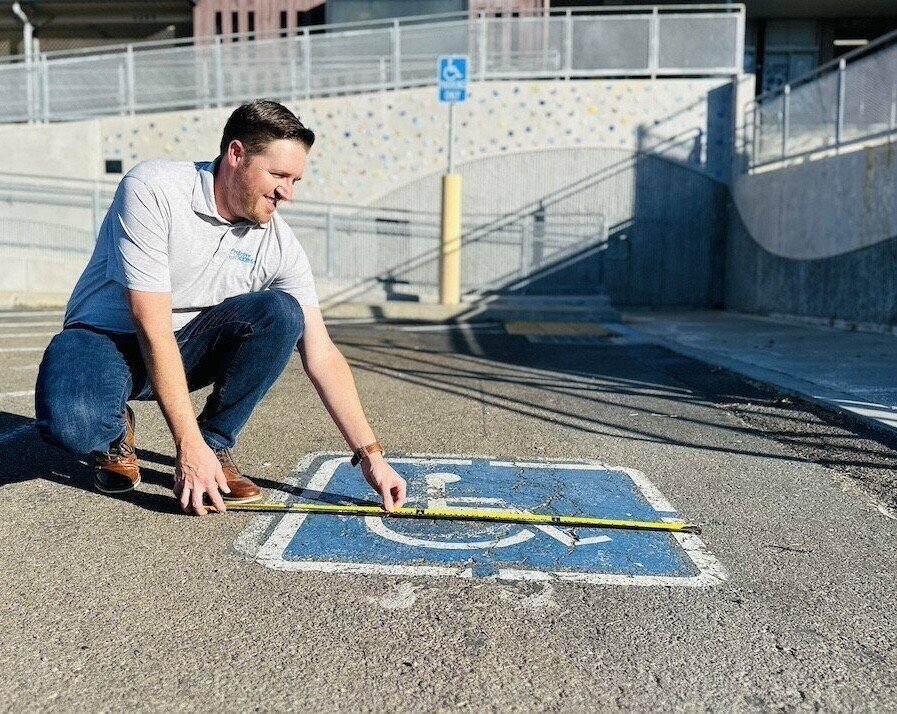Certified Access Specialist (CASp) | California Accessibility Experts
What is a Certified Access Specialist (CASp)
The term “CASp” is an acronym that stands for Certified Access Specialist. A Certified Access Specialist is an expert in accessibility. The California Division of the State Architect (DSA) certifies them as accessibility experts.
CASp Inspectors evaluate buildings and facilities for compliance with the Americans with Disabilities Act (ADA). They also ensure compliance with the California Building Code (Title 24).
California Senate Bill 1608 created the Certified Access Specialist program in 2008.
This was in response to many ADA lawsuits against small businesses. The goal was to provide a trusted resource for business and property owners. They needed expert help with construction-related accessibility compliance.
Why Hire a Certified Access Specialist
Engaging a CASp Inspector offers more than just legal protection. It is an investment in your business, your community, and your reputation.
Legal Protection & Risk Reduction – Reduce exposure under SB 1186
Enhanced Accessibility – Identify and correct barriers to create a more welcoming and inclusive built environment for customers and staff
Credible Documentation – Gain a formal CASp report that validates your compliance efforts
Community Trust & Reputation – Show customers that accessibility is a priority
Economic Opportunity – Accessibility improvements can attract the nearly 28.7% of Americans living with disabilities
Role and Expertise of a CASp Inspector
A Certified Access Specialists is uniquely qualified to:
Conduct thorough site evaluations for privately owned facilities that are open to the general public
Review construction plans and building designs for accessibility compliance
Identify barriers to accessibility that could lead to legal risk
Issue CASp Reports and Certificates that provide legal protections to property owners
CASp Inspectors are the only professionals in California who can issue official CRASCA Reports and DAIC Certificates. These documents show a good-faith effort toward achieving compliance. They also help deter serial plaintiffs who target businesses that do not comply.
History of the CASp Program
The Certified Access Specialist program was born from a need for specialized accessibility experts in California. Before 2008, many business owners did not know about changing code requirements. This made them open to ADA lawsuits for discrimination against people with disabilities.
SB 2008 – Establishes the CASp program to certify accessibility specialists.
SB 1186 – Provides legal benefits to properties that are inspected by a CASp.
Over the years, the program has grown to include many Certified Access Specialists. They help businesses with reliable documents and guide them toward accessibility compliance.
The creation of Certified Access Specialist program was an important achievement for California accessibility. It helped protect California businesses and promote accessibility and inclusion in the state.
CASp Certification Process
Becoming a CASp requires specialized training and rigorous state testing. To earn certification, candidates must demonstrate:
Advanced knowledge of federal ADA standards as well as the California Title 24 accessibility codes
An ability to perform on-site inspections of commercial properties and public places.
Issue detailed reports prepared in accordance with CRASCA.
Competence in identifying both obvious and subtle barriers to accessibility
Certified Access Specialists must maintain their credentials through continuing education, ensuring they stay current with evolving codes and regulations.
Professional Expertise of Our Proactive Access CASp Inspector Team
We provide CASp inspection services throughout all of Southern California and our Certified Access Specialists bring years of experience, technical knowledge, and practical expertise:
Evaluating new construction, renovations, and existing facilities for accessibility compliance
Applying complex building codes and federal standards to real-world scenarios
Providing clear, actionable recommendations for barrier removal and corrective action
Advising property owners on compliance strategy and legal risk mitigation
With over 1,000 inspections completed, our CASp Inspectors are trusted advisors for businesses across California.
Frequently Asked Questions About Certified Access Specialists (CASp)
-
A CASp Inspector evaluates properties for compliance with ADA and California Building Code (Title 24). They identify physical access barriers, interpret building plans, and provide CASp Reports that document your property’s compliance.
Certified Access Specialists are certified by the State of California. They can issue CASp Inspected certificates. These certificates provide legal protections for your business.Learn More About CASp Inspections
-
To become a Certified Access Specialist, candidates must:
Complete specialized training on federal and state accessibility standards.
Pass a rigorous state-administered exam through the Division of State Architect (DSA).
Maintain certification through continuing education and periodic updates on code changes.
-
CASp Inspectors are trained to evaluate:
Commercial buildings
RestaurantsRetail spaces
Medical
Lodging
Gas Stations
Public Facilities
New construction and renovation projects
-
While both roles focus on accessibility, a CASp Inspector is:
Certified by the State of California
Authorized to issue CASp Reports and certificates
Legally recognized as a Qualified Defendant in construction-related accessibility lawsuits
An ADA Inspector may perform accessibility reviews under federal standards but cannot issue an official CASp Report. Only reports prepared in accordance with CRASCA are granted legal benefits recognized in California.
-
A CASp certificate:
Demonstrates proactive compliance with ADA and California accessibility codes
Provides documentation that can reduce damages if a lawsuit arises
Signals to customers and the community that your business values accessibility
Deters serial plaintiffs from targeting non-compliant facilities
-
While there is no legal requirement for annual inspections, it’s recommended to schedule a CASp evaluation whenever:
You are planning renovations or construction
You want to maintain compliance documentation for legal protection
Accessibility issues have been reported or identified by staff or customers
Regular CASp inspections help businesses stay ahead of code changes and avoid costly accessibility violations.
-
Yes. CASp Inspectors provide credible documentation of your compliance efforts. If a construction-related accessibility lawsuit arises, a CASp Inspector can:
Review allegations and make a determination as to whether they are valid.
Provide guidance toward ADA and California accessibility compliance
Help your property qualify as a Qualified Defendant to avoid future litigation


